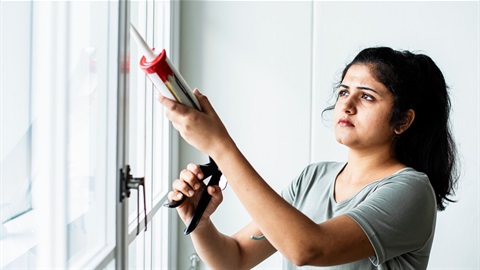Energy-saving tips

Set your thermostat
- 18-20 degrees in Winter and 23-26 in Summer is recommended
- Only heat/cool areas you're using
- Close curtains and blinds at night to keep the warm air in and reduce heat/cold loss through windows
Fit draught seals to window and door openings
- Seal around windows and caulk/fill ceiling/skirting board gaps
- Fixed ventilation openings required for flueless and open flued gas heaters must not be blocked. Get a licensed gas fitter to check the safe operation of the appliances before they are used.
- Have your gas appliances serviced at least every 2 years.
Turn off non-essential appliances at the switch
- Turn off non-essential appliances such as computers, printers, televisions and entertainment systems at their power points
- Electronic devices can use up to 10% of your household's electricity on standby.
Replace old, inefficient systems
Consider replacing old, inefficient gas heaters/air conditioners with reverse-cycle units and start to electrify your home.
Run a full washing load
- Wait until your washing machine and dishwasher are full before running a cycle
- For greater savings, choose the shortest washing cycle
- Save between $40 and $80pa by selecting the cold water setting on your washing machine.
Replace your old showerhead
This will save you around $160 yearly on energy and water bills
Insulate your roof
- Effective ceiling insulation can save you up to 20% on your bills. If you've already had insulation installed, check that it's been done correctly
- Borrow the Energy-saver kit from any Ku-ring-gai library and use the high-tech thermal camera to check gaps in your insulation.
Let the cool air in
- Turn your air conditioner off in the evening and open doors and windows
- Use the economy, eco, econo or active energy control setting on your air conditioner remote if you have one. It saves energy and money by running your air conditioner’s compressor slower and moderating its cooling output.
Set your fridge between 3 to 5 degrees and your freezer to -15 degrees
- Fridges are one of the most expensive appliances in your home
- Ensure that your fridge is set between 3-5 degrees and your freezer is set at -15 degrees
- Running a second fridge? Turn it off when not in use.
Maximise your solar energy
- If you don't already have solar, use our online tool to find out what is would cost on your roof
- Consider switching your energy usage from night to daytime, to save energy and lower bills
- If your home is well insulated, consider pre-cooling your home on summer afternoons while the sun is still high in the sky. This may lessen the amount of cooling energy needed for the evening peak
- Set a timer. Take advantage of your solar energy to run throughout the day.
Install an energy-efficient pool pump
We offer $250 rebates for residents who replace existing inefficient, single-speed pool pumps with an energy efficient pool pump (7-star rated and as listed by EnergyRating.gov.au). Claim now.
Get started